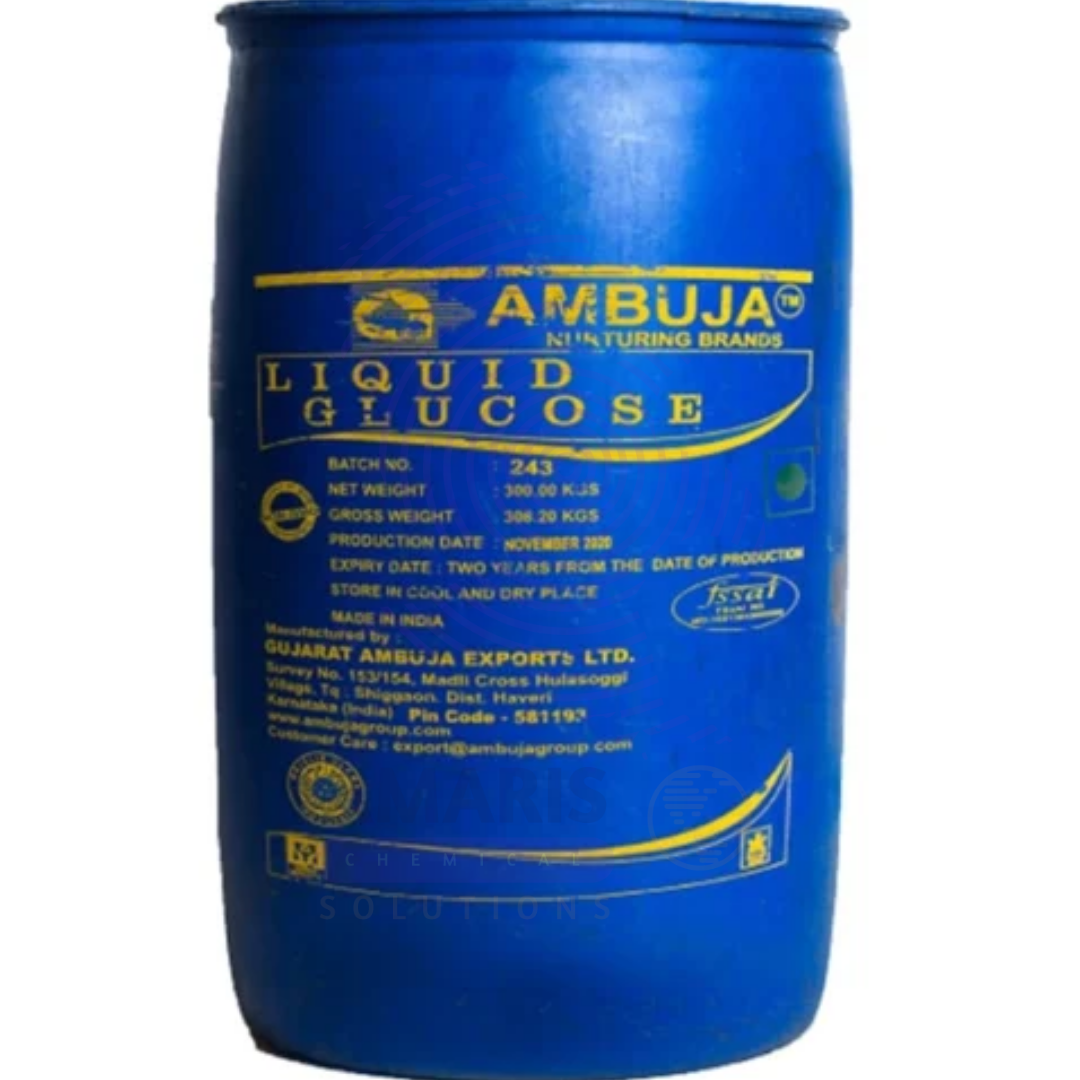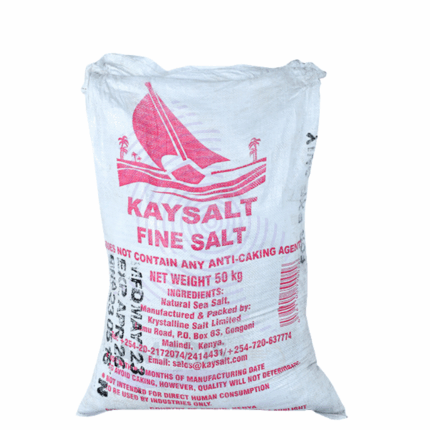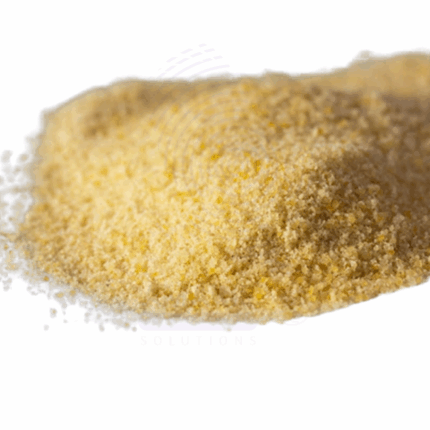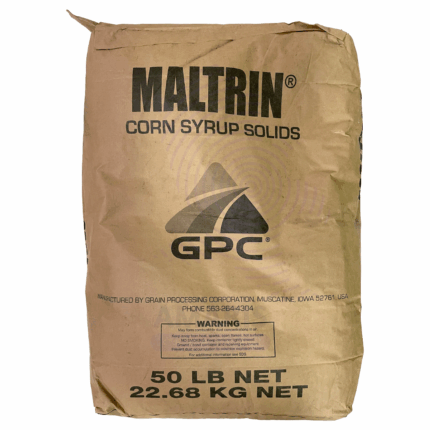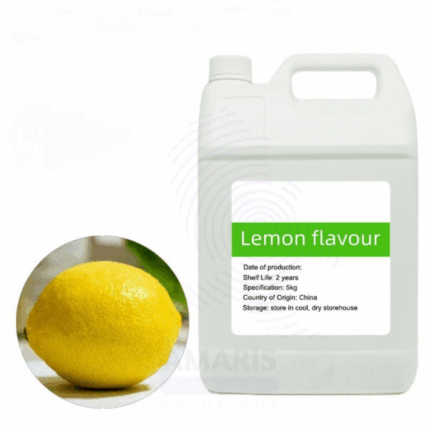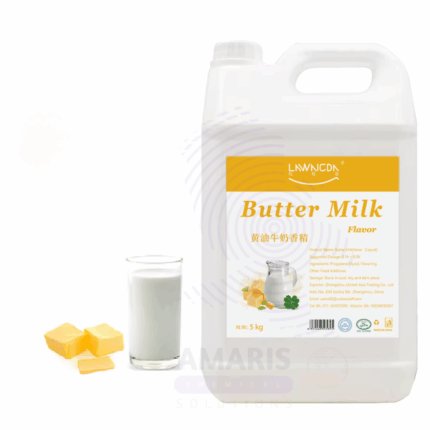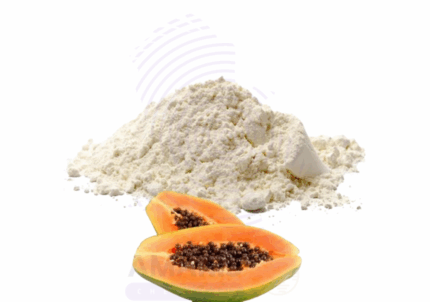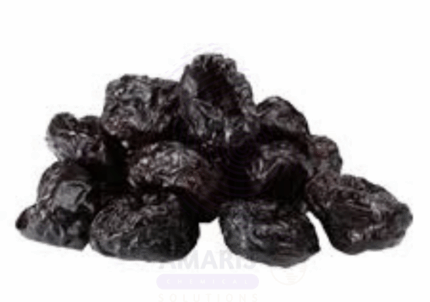
Liquid Chlorine
$ 2.22 Original price was: $ 2.22.$ 2.11Current price is: $ 2.11.
Liquid Glucose
$ 1.15
Whatsapp Order
Liquid Glucose is a viscous, clear to pale amber syrup primarily composed of glucose and other saccharides. It is produced by the enzymatic hydrolysis of starch derived from corn, wheat, or potatoes. Known for its high sweetness and excellent moisture-retention properties, Liquid Glucose is widely used in the food and beverage industry to enhance texture, sweetness, and shelf life. It also acts as a humectant and crystallization inhibitor, improving the quality and consistency of various processed foods.
Category: Sweeteners
Tags: Bakery Ingredient, Corn Syrup, Food Processing, Glucose Syrup, Liquid Glucose, Sweetener
Description
Table of Contents
Toggle
Liquid Glucose
Primary Uses
- Food and Confectionery Industry
- Used as a sweetener in candies, chewing gums, and toffees, providing a smooth texture and preventing sugar crystallization.
- Acts as a humectant in baked goods, helping retain moisture and prolong freshness in products like cakes, cookies, and bread.
- Serves as a binding agent and viscosity enhancer in syrups, sauces, and dessert fillings.
- Beverage Industry
- Added to soft drinks, energy drinks, and fruit juices as a source of fermentable sugars and to improve mouthfeel and sweetness balance.
- Pharmaceuticals and Nutraceuticals
- Used as a carrier and sweetening agent in syrups, cough medicines, and vitamin formulations to improve palatability and texture.
- Cosmetics and Personal Care
- Incorporated as a humectant and skin-conditioning agent in lotions, creams, and hair care products to maintain moisture and improve spreadability.
Secondary Uses
- Industrial Applications
- Used in fermentation processes as a glucose source for microbial growth in biotechnology and pharmaceutical production.
- Animal Feed
- Occasionally added as an energy source and palatability enhancer in animal feed formulations.
- Food Packaging
- Utilized in edible coatings and films for fruits and vegetables to enhance shelf life and appearance.
KEY PRODUCT FEATURES
1. Basic Identification Attributes
- Chemical Name (IUPAC): D-Glucose syrup
- Common/Trade Name: Liquid Glucose; Glucose Syrup; Starch Hydrolysate
- CAS Number: 9050-36-6
- HS Code: 1702.90.00
- Synonyms: Glucose syrup; Corn syrup; Dextrose syrup
2. Physical & Chemical Properties
- Physical State: Viscous liquid (syrup)
- Color & Odor: Clear to pale amber; mild sweet odor
- pH: Typically 4.0 – 6.0
- Solubility: Miscible with water
- Sweetness: Approximately 70-80% relative to sucrose
- Viscosity: High, dependent on concentration and dextrose equivalent (DE)
3. Safety & Hazard Attributes
- GHS Classification: Not hazardous under normal use
- Toxicity: Non-toxic; food-grade material
- Exposure Limits: Not applicable
4. Storage & Handling Attributes
- Storage Conditions: Store in a cool, dry place away from direct sunlight and contamination
- Container Type: Food-grade plastic drums or stainless steel containers
- Shelf Life: Typically 12 to 24 months when stored properly
- Handling Precautions: Avoid contamination; maintain hygiene
5. Regulatory & Compliance Attributes
- Approved as a food additive and ingredient by FDA, EFSA, and Codex Alimentarius
- Complies with food safety and purity standards for sweeteners and syrups
6. Environmental & Health Impact
- Biodegradability: Readily biodegradable
- Ecotoxicity: Low environmental impact when released in small quantities
- Bioaccumulation: Not applicable
- Carcinogenicity/Mutagenicity: Not classified
SAFETY HANDLING PRECAUTIONS
Safety Handling Precautions
- PPE Required: None generally required for food-grade handling
- Handling Guidelines: Maintain hygienic conditions; avoid microbial contamination
- Storage Measures: Keep sealed and protected from moisture and contaminants
First Aid Measures
- Inhalation: Not applicable due to liquid state
- Skin Contact: Wash with water if sticky residue causes irritation (rare)
- Eye Contact: Rinse with water if contact occurs
- Ingestion: Safe for consumption in food quantities
Firefighting Measures
- Fire Hazards: Non-flammable but may burn if exposed to high heat
- Extinguishing Media: Use water spray, foam, or dry chemical extinguishers
- Special Precautions: Avoid inhalation of smoke or vapors in fire conditions
Related products
Bakery Salt
$ 1.11
Bakery salt is a finely ground, food-grade salt specifically processed for use in baking and food preparation. It is characterized by its purity, consistent grain size, and minimal additives to ensure it blends evenly in doughs and batters. Bakery salt enhances flavor, improves dough texture, controls yeast fermentation, and extends the shelf life of baked goods. Due to its fine granules, it dissolves quickly and evenly, making it ideal for commercial and home baking applications.
Caramel Powder Flavor
Caramel Powder Flavor is a highly concentrated powdered flavoring agent designed to impart the rich, sweet, and buttery aroma and taste of caramel to a wide range of products. Produced through controlled caramelization of sugars and natural extracts, this flavor powder delivers authentic caramel notes without artificial additives. Its fine powder form ensures easy blending, precise dosing, and extended shelf life. Commonly used in food and beverage manufacturing, it enhances sensory appeal in bakery products, confectionery, dairy items, and beverages. Its versatility also makes it suitable for flavoring applications in personal care and cleaning products.
Corn Syrup
Corn Syrup is a viscous, sweet liquid derived from the enzymatic hydrolysis of corn starch. It consists primarily of glucose and maltose along with higher saccharides, providing sweetness, viscosity, and moisture retention in food formulations. Corn Syrup is widely used in food and beverage industries as a sweetener, humectant, and texture enhancer. Its ability to prevent crystallization and retain moisture makes it essential in confectionery, baking, and processed foods. Industrial grades of corn syrup are also used in pharmaceuticals and other manufacturing applications where its binding and stabilizing properties are valued.
Glycerin
$ 1.20
Glycerin, also known as glycerol, is a colorless, odorless, viscous liquid with a sweet taste and hygroscopic properties. It is a trihydroxy alcohol (triol) used extensively across food, pharmaceutical, cosmetic, and industrial applications. Food-grade glycerin is produced through hydrolysis, saponification, or transesterification of fats and oils, ensuring compliance with stringent purity standards. It is supplied in bulk (e.g., 250kg drums) for large-scale applications where non-toxic, biodegradable humectants or solvents are required. Glycerin is widely appreciated for its moisture-retaining ability, solubility, lubricity, and stabilizing properties.
Lemon Liquid Flavor
Lemon Liquid Flavor is a high-quality, citrus-based flavoring solution designed to impart the tangy, zesty taste of fresh lemons to a variety of food and beverage products. Known for its bright, refreshing profile, it is widely used in both sweet and savory formulations. The liquid form allows for easy mixing and dispersion in syrups, confections, baked goods, and dairy products. Its stability under typical processing conditions and compatibility with other flavor notes make it a versatile and essential ingredient in the food industry.
Milk Butter Liquid Flavour
Milk Butter Liquid Flavour is a rich and creamy flavoring agent designed to replicate the smooth, savory taste of fresh milk and real butter. This food-grade flavor is widely used in the food and beverage industry to impart a full-bodied dairy profile, adding indulgent and comforting notes to various products. Its excellent solubility, thermal stability, and compatibility with both sweet and savory formulations make it an ideal ingredient in bakery goods, confectionery, dairy-based products, and sauces. It enhances overall flavor depth and mouthfeel in both processed and gourmet food items.
papain
Papain is a proteolytic enzyme extracted from the latex of the papaya fruit (Carica papaya). It breaks down proteins into peptides and amino acids, making it widely used in various industries. Papain has excellent catalytic activity and works effectively across a broad pH range, especially in neutral to slightly alkaline conditions. It is valued for its meat tenderizing, digestive aid, and therapeutic properties.
Prunes
Prunes are dried plums that serve as a natural source of dietary fiber, vitamins, and antioxidants. They are widely used in food products and snacks to provide natural sweetness, improve digestive health, and enhance nutritional value. Supplied in bulk 5 kg packaging, prunes are ideal for commercial and industrial food applications.


 Preservatives(food)
Preservatives(food) Flavor Enhancers
Flavor Enhancers Acidulants
Acidulants Sweeteners
Sweeteners Antioxidants
Antioxidants Colorants(food)
Colorants(food) Nutraceutical Ingredients (food)
Nutraceutical Ingredients (food) Nutrient Supplements
Nutrient Supplements Emulsifiers
Emulsifiers
 Collectors
Collectors Dust Suppressants
Dust Suppressants Explosives and Blasting Agents
Explosives and Blasting Agents Flocculants and Coagulants
Flocculants and Coagulants Frothers
Frothers Leaching Agents
Leaching Agents pH Modifiers
pH Modifiers Precious Metal Extraction Agents
Precious Metal Extraction Agents
 Antioxidants(plastic)
Antioxidants(plastic) Colorants (Pigments, Dyes)
Colorants (Pigments, Dyes) Fillers and Reinforcements
Fillers and Reinforcements Flame Retardants
Flame Retardants Monomers
Monomers Plasticizers
Plasticizers Polymerization Initiators
Polymerization Initiators Stabilizers (UV, Heat)
Stabilizers (UV, Heat)
 Antifoaming Agents
Antifoaming Agents Chelating Agents
Chelating Agents Coagulants and Flocculants
Coagulants and Flocculants Corrosion Inhibitors
Corrosion Inhibitors Disinfectants and Biocides
Disinfectants and Biocides Oxidizing Agents
Oxidizing Agents pH Adjusters
pH Adjusters Scale Inhibitors( water)
Scale Inhibitors( water)
 Antioxidants(cosmetic)
Antioxidants(cosmetic) Emollients
Emollients Fragrances and Essential Oils
Fragrances and Essential Oils Humectants
Humectants Preservatives
Preservatives Surfactants(cosmetic)
Surfactants(cosmetic) Thickeners
Thickeners UV Filters
UV Filters
 Fertilizers
Fertilizers Soil Conditioners
Soil Conditioners Plant Growth Regulators
Plant Growth Regulators Animal Feed Additives
Animal Feed Additives Biostimulants
Biostimulants Pesticides (Herbicides, Insecticides, Fungicides)
Pesticides (Herbicides, Insecticides, Fungicides)
 Active Pharmaceutical Ingredients (APIs)
Active Pharmaceutical Ingredients (APIs) Excipients
Excipients Solvents(pharmaceutical)
Solvents(pharmaceutical) Antibiotics
Antibiotics Antiseptics and Disinfectants
Antiseptics and Disinfectants Vaccine Adjuvants
Vaccine Adjuvants Nutraceutical Ingredients (pharmaceutical)
Nutraceutical Ingredients (pharmaceutical) Analgesics & Antipyretics
Analgesics & Antipyretics
 Analytical Reagents
Analytical Reagents Solvents(lab)
Solvents(lab) Chromatography Chemicals
Chromatography Chemicals Spectroscopy Reagents
Spectroscopy Reagents microbiology-and-cell-culture-reagents
microbiology-and-cell-culture-reagents Molecular Biology Reagents
Molecular Biology Reagents Biochemical Reagents
Biochemical Reagents Inorganic and Organic Standards
Inorganic and Organic Standards Laboratory Safety Chemicals
Laboratory Safety Chemicals Specialty Laboratory Chemicals(Special Laboratory Equipment)
Specialty Laboratory Chemicals(Special Laboratory Equipment)
 Demulsifiers
Demulsifiers Hydraulic Fracturing Fluids
Hydraulic Fracturing Fluids Scale Inhibitors(oil)
Scale Inhibitors(oil) Surfactants(oil)
Surfactants(oil) Drilling Fluids
Drilling Fluids
 Dyes and Pigments
Dyes and Pigments Bleaching Agents
Bleaching Agents Softening Agents
Softening Agents Finishing Agents
Finishing Agents Antistatic Agents
Antistatic Agents
 Admixtures
Admixtures Waterproofing Agents
Waterproofing Agents Sealants and Adhesives
Sealants and Adhesives Curing Compounds
Curing Compounds Concrete Repair Chemicals
Concrete Repair Chemicals Anti-Corrosion Coatings
Anti-Corrosion Coatings
 Surfactants(cleaning)
Surfactants(cleaning) Builders
Builders Enzymes
Enzymes Solvents (Cleaning)
Solvents (Cleaning) Fragrances
Fragrances
 Electronic Chemicals
Electronic Chemicals Catalysts
Catalysts Lubricants
Lubricants Photographic Chemicals
Photographic Chemicals Refrigerants
Refrigerants Automotive chemicals
Automotive chemicals Pyrotechnic Chemicals
Pyrotechnic Chemicals
 Biodegradable Surfactants
Biodegradable Surfactants Bio-based Solvents
Bio-based Solvents Renewable Polymers
Renewable Polymers Carbon Capture Chemicals
Carbon Capture Chemicals Wastewater Treatment Chemicals
Wastewater Treatment Chemicals
 Pigments
Pigments Solvents(paint)
Solvents(paint) Specialty Coatings
Specialty Coatings Binders/Resins
Binders/Resins Additives
Additives Driers
Driers Anti-Corrosion Agents
Anti-Corrosion Agents Functional Coatings
Functional Coatings Application-Specific Coatings
Application-Specific Coatings
 Leavening Agents
Leavening Agents Dough Conditioners
Dough Conditioners Flour Treatments
Flour Treatments Fat Replacers
Fat Replacers Decoratives
Decoratives Preservatives(baking)
Preservatives(baking)
 Plasticizers & Softeners
Plasticizers & Softeners Reinforcing Agents
Reinforcing Agents Adhesion Promoters
Adhesion Promoters Vulcanizing Agents
Vulcanizing Agents Antidegradants
Antidegradants Blowing Agents
Blowing Agents Fillers & Extenders
Fillers & Extenders Accelerators & Retarders
Accelerators & Retarders